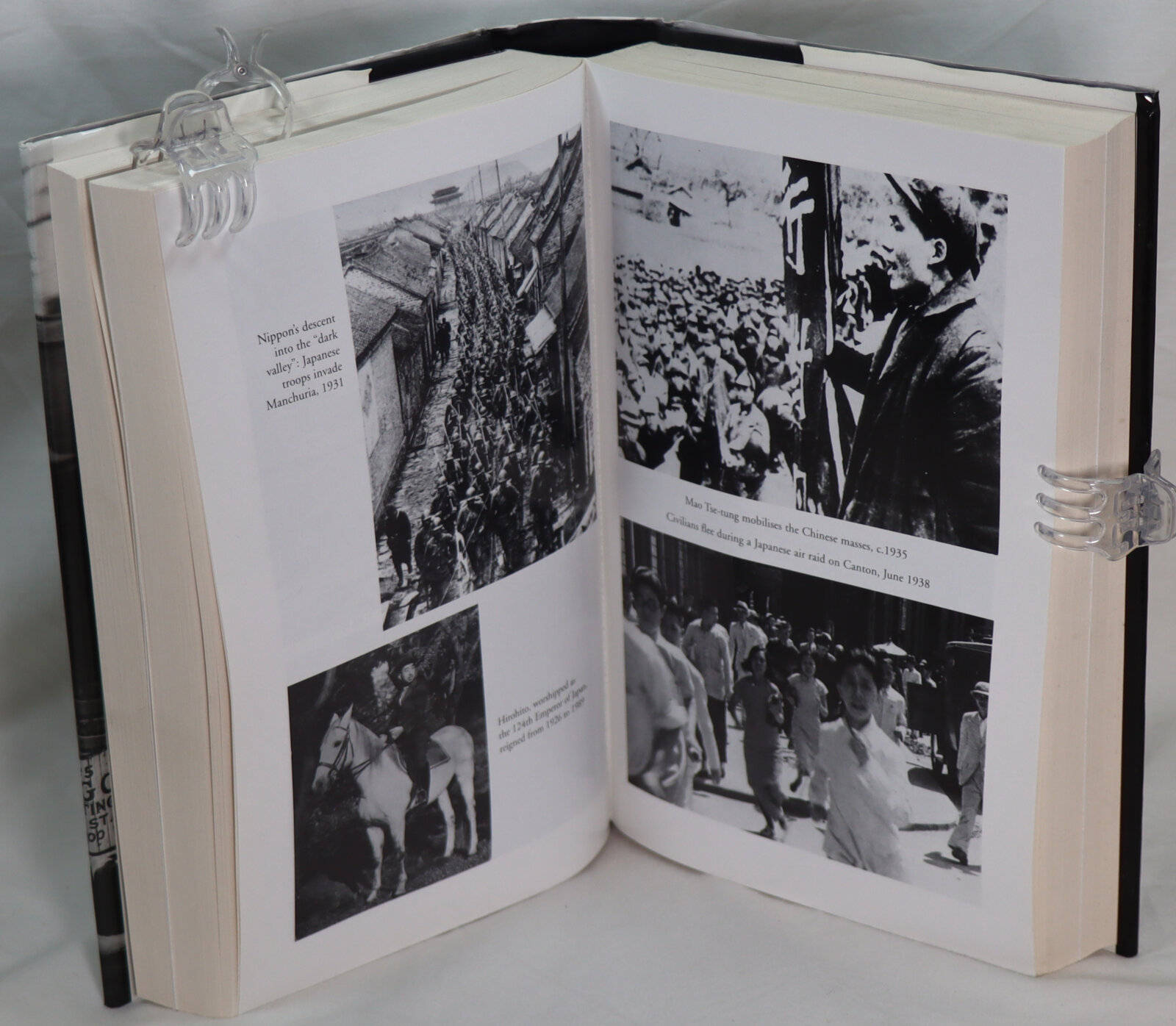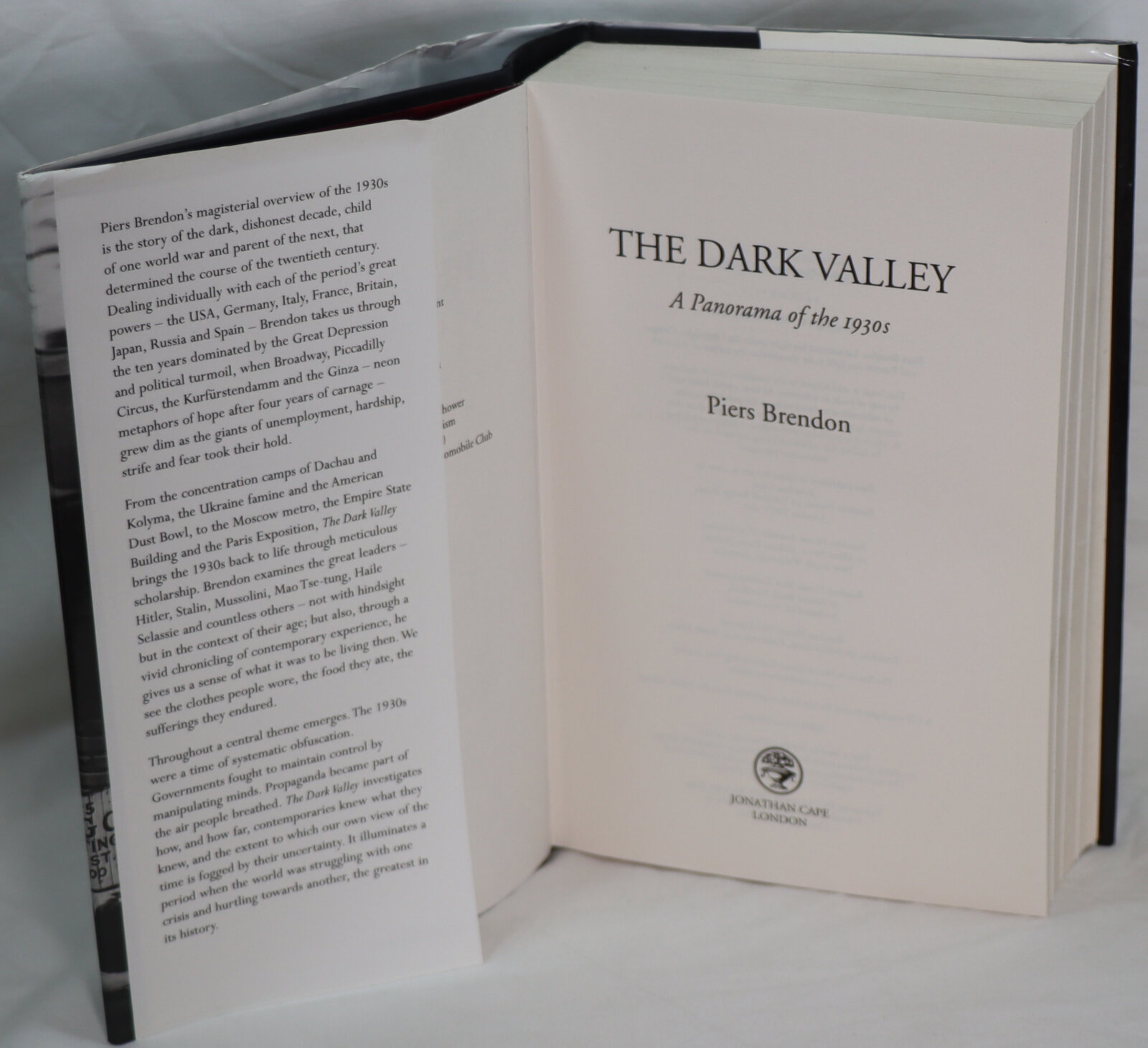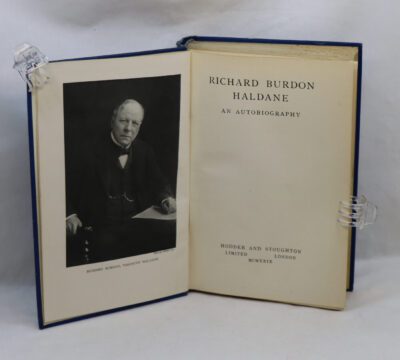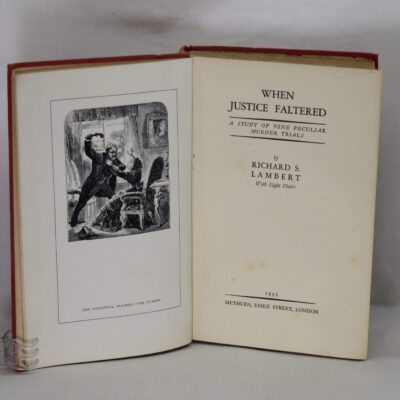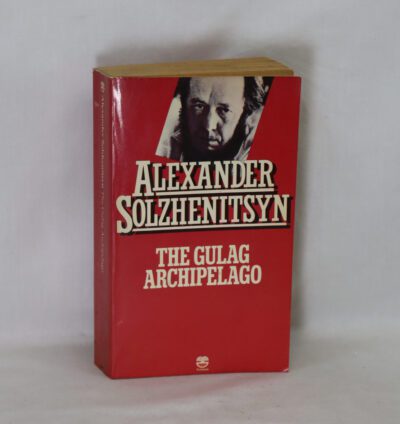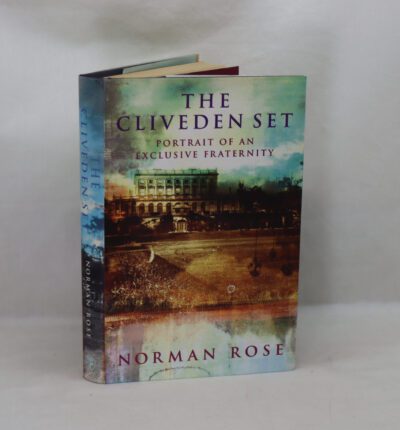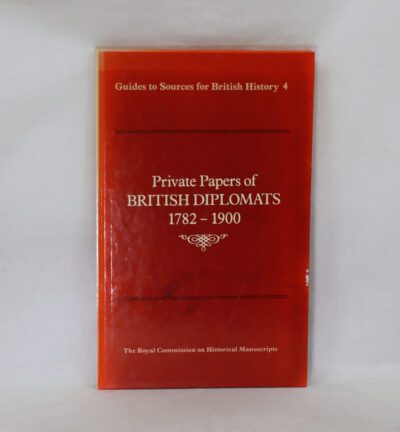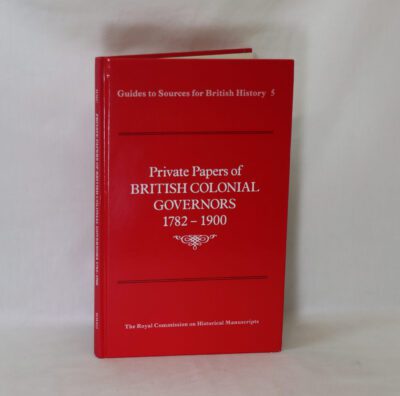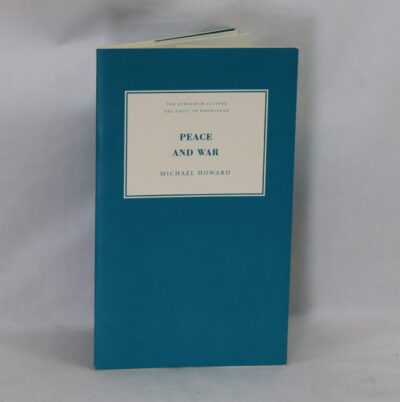The Dark Valley. A Panorama of the 1930s.
By Piers Brendon
ISBN: 9780224060387
Printed: 2000
Publisher: Jonathan Cape. London
| Dimensions | 17 × 24 × 6 cm |
|---|---|
| Language |
Language: English
Size (cminches): 17 x 24 x 6
Condition: Fine (See explanation of ratings)
Your items
Item information
Description
In the original dustsheet. Black cloth binding with gilt title on the spine.
-
F.B.A. provides an in-depth photographic presentation of this item to stimulate your feeling and touch. More traditional book descriptions are immediately available.
Piers Bendon’s magisterial overview of the 1930s is the story of the dark, dishonest decade, child of one world war and parent of the next, that determined the course of the twentieth century. Dealing individually with each of the period’s great powers – the USA, Germany, Italy, France, Britain, Japan and Russia – Brendon takes us through the ten years dominated by the Great Depression and political turmoil, when Broadway, Piccadilly Circus, the Kurfurstendam and the Ginza – neon metaphors of hope and modernity after four years of carnage – grew dim as the giants of unemployment, hardship, strife and fear took their hold. From the concentration camps of Dachau and Kolyma, the Ukraine famine, the American Dust Bowl, to the Tokyo earthquake, the Empire State Building and the Paris Exposition, The Dark Valley examines the great leaders – Hitler, Stalin, Mao Tse-tung, Haile Selassie and countless others – not with hindsight but in the context of their age; but also, through a meticulous chronicling of contemporary experience, he gives us a sense of what it was to be living then. We see the clothes people wore, the food they ate, the sufferings they endured.
Review: “Dark Valley” as a phrase was coined first by the Japanese to refer to the desperate years of chaotic depression that followed the 1929 slump. But, as Piers Brendon’s epic history of the same name vividly demonstrates, it was apt to describe any of the world’s leading nations–the crippled, traumatised European powers, a moody, solitary US, Stalin’s outcast Russian Soviet and volatile, upstart Japan–of the time, with varying degrees of severity and fascinatingly contrasting outcomes. With no dishonour to those who endured the unspeakable traumas of the First World War, reading Brendon’s scholarly tome leaves little scope to argue with the assertion, made by Leon Blum, amongst others, that the economic crisis and its effects were as traumatic as the “war to end all wars”. Worse was to come, for sure, but the events that led to the “chasm” of the Second World War still boggle the mind–from our safe distance it is difficult to comprehend that this actually came to pass, yet at the same time the whole era seems to be engulfed by a fatalistic air of inevitability. In many ways, the insane dance of rampant ideological forces and economic desperation unleashed across the sphere make for the more gripping history, and in Brendon’s hands the cast of thousands is skillfully evoked while the facts are judiciously evaluated in a rolling narrative through the tribulations of the era. This is first-class historical writing, but certainly not for the faint-hearted. –Alisdair Bowles
Reviews:
-
“The best history book I’ve read since Orlando Figes’s’ A People’s Tragedy…wonderful and enthralling.” (Ruth Rendell Daily Telegraph)
-
“Brilliant, cinematic, utterly illuminating… No other historical account I know can rival this… Masterly.” (Valentine Cunningham Financial Times)
-
“A delight to read, a literary triumph sparkling with moments of real humour and compassion.” (Richard Overy Sunday Telegraph)
-
“Piers Brendon’s long book has such brilliance and narrative power, and contains so much fascinating detail, that reading it has all the excitement of novelty.” (John Grigg Evening Standard)
-
A worldwide survey of the 1930s – popular history of breathtaking scholarship and scope.
-
Acclaim for ‘The Dark Valley’ – ‘[Brendon’s] story takes in everything and everywhere that matters between the 20th century’s two world wars, moving with knowledge, insight and wit across all the Great Power axes, Britain, the US, France, Germany, Italy, Japan, the USSR. His detail – brilliant, cinematic, utterly illuminating – is arranged with a canny storyteller’s knack. No other historical account I know can rival this.’ Valentine Cunningham, ‘Financial Times’ ‘Brendon’s canvas is global, and he paints every inch of it brilliantly … leading the reader from one chapter to the next in such a way that it is hard to put the book down… ‘The Dark Valley’ is scholarly popular history to rank with Norman Davies’s history of Europe or Anthony Beevor’s ‘Stalingrad’, and deserves to be equally successful. It should dominate the non-fiction bestseller lists for months to come.’ John Campbell, ‘Independent’ ‘A delight to read, a literary triumph sparkling with moments of real humour and compassion, sombre where it needs to be. Brendon is the master of the swift pen portrait, the telling anecdote, the curious footnotes to history that tell us more than a page of dusty scholarship.’ Richard Overy, ‘Sunday Telegraph’ ‘Has any decade in human history been more written about than the 1930s?… Piers Brendon’s long book has such brilliance and narrative power, and contains so much fascinating detail, that reading it has all the excitement of novelty.’ John Grigg, ‘Evening Standard’ ‘Historians are seldom thought of as elegant stylists, let alone as comic writers of the first rank. Piers Brendon is both: and despite his dispiriting subject matter – this was, after all, the decade that saw the rise of Hitler, mass unemployment, Stalin’s purges, the Spanish Civil War and the invasions of Poland – he manages to combine a sense of menace and betrayal with sharp and funny character sketches, and an eye for the telling detail that puts most novelists to shame.’ Jeremy Lewis, ‘Sunday Express’ ‘This is a salutary book. The European values of tolerance and compassion only made it through the 20th century by the skin of their teeth, and never did they look more vulnerable than in the 1930s… ‘
-
The Dark Valley’ explains why – with a page-turning panache that should be treasured by the academic and general reader alike.’ Misha Glenny, ‘Irish Times’ ‘
-
Excellent… Brendon tells the story of this enormous and weighty subject with great skill and good humour.’ Antony Beevor, ‘Mail on Sunday’
-
‘Should be read by anyone who wants to understand the terrible harm that world recession, allied with fanatical ideology in some quarters, and feeble leadership in others, did then – and could do again.’ David Cannadine, ‘Observer’
-
‘A tour de force.’ Michael Pye, ‘Scotsman’
Piers Brendon FRSL (born 21 December 1940) is a British historian and writer, known for historical and biographical works. He was educated at Shrewsbury School and Magdalene College, Cambridge, where he read history. He received a Ph.D. degree for his thesis, Hurrell Froude and the Oxford Movement, which was published, with much modification, in 1974. From 1965 to 1978, he was lecturer in history, then principal lecturer and head of department, at what is now Anglia Ruskin University. Since 1979, he has worked as a freelance writer of books, journalism and for television. In 1995, he became a fellow of Churchill College, Cambridge and was keeper of the Churchill Archives Centre from 1995 to 2001, in succession to Correlli Barnett. Brendon was himself succeeded by Allen Packwood.
Want to know more about this item?
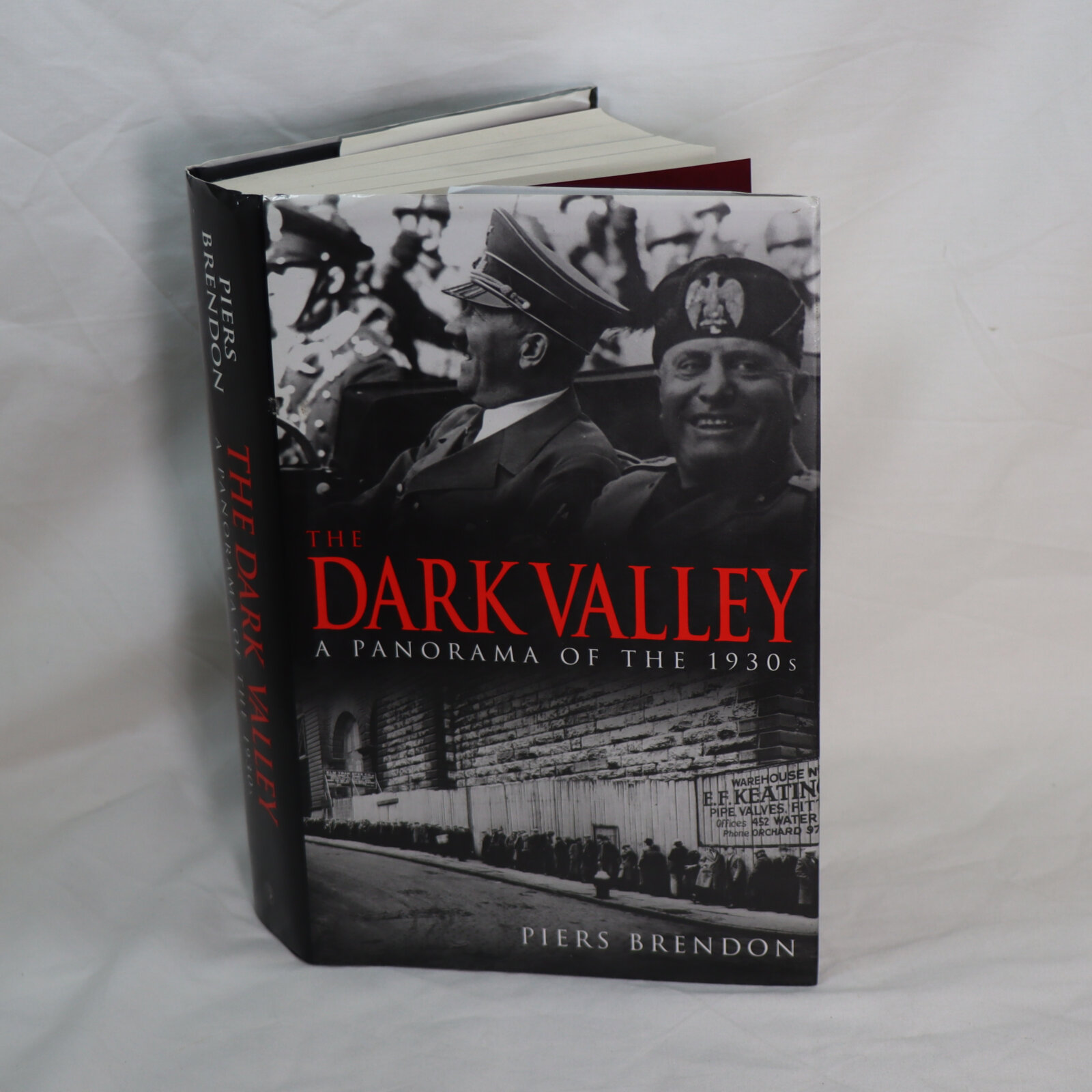
Related products
Share this Page with a friend

